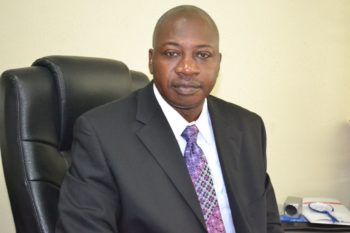A former Managing Director of the Nigerian Ports Authority (NPA), Engr Omar Suleiman and the current Managing Director, Ms Hadiza Bala Usman have differed on the appropriateness of 20 per cent Federal Government equity in the public private partnership (PPP) model for the establishment of deep seaports in Nigeria.
The country’s current policy on PPP for establishment of deep seaports provides that the private sector investor in the deep seaport project provides 60 per cent investment equity, while the community represented by the state and the Federal Government provide investment stakes of 20 per cent each.
Speaking in an exclusive interview with SHIPS & PORTS DAILY in Abuja recently, Suleiman said the 20 per cent stake from the Federal Government is “too small” considering the enormity of deep seaport projects, where about 50 per cent of total cost is taken up by construction of breakwater, which ought to be done by government and not the private sector investor.
But speaking at a luncheon held for journalists on Wednesday in Lagos, Usman said the 20 per cent equity stake from Federal Government is too high. She posited that with so much requiring government fund, there was need for government to cut down on its 20 per cent investment in deep seaports.
However, Suleiman blamed failure of deep seaport projects on the country’s 60, 20, 20 ownership policy, saying the Federal Government leaves too much for the private sector investor.
He explained that with the private sector investor required to fund breakwater construction which takes up to 50 per cent of the total cost of building a deep seaport, not many private investors are willing to take the challenge, stressing that government should naturally fund construction of breakwater in deep seaport projects.
He said, “Something that the government should look into and I have said it before is the government policy of PPP for port infrastructure. The government policy on PPP is too general. The country will need a more specific PPP for maritime and port building. We need a very special form of PPP to cater to maritime infrastructure. The major part in building a deep seaport is construction of breakwater. Once the breakwater is done it remains the keys and the dredging and anybody can do that.
“The breakwater takes about 50 per cent; ask anyone in any country, breakwater takes 50 per cent of the total cost of building a deep seaport and usually there is no private individual that does breakwater in most countries except in very special arrangements. Government does the breakwater through its agency, as in this case, the Nigerian Ports Authority.
“Yes, the government is leaving much to the private sector than the private sector can handle because the Nigerian PPP model is 60, 20, 20 for private sector, state government and federal government respectively. The total of 40 per cent from government cannot do the breakwater and that is why we do not have a deep seaport by now.
He said he had in several presentations to the presidency and government’s economic advisers during his time as managing director of NPA stated that government up its stake in the PPP arrangement for deep seaport development, as well as recommended a special infrastructure commission for the maritime industry if the government wants to move the industry forward.
“The maritime infrastructure commission will understand the complexities involved in maritime infrastructure and they will tailor the type of ratio investment to maritime infrastructure. The life span of maritime infrastructure is not less than 25 years unlike many other infrastructure. So we need a body that understand maritime infrastructure so that they can plan for the maritime industry in terms of infrastructure. If we have the maritime infrastructure commission, then as we are saying we cannot have a general transport regulator. It won’t work. We have to get a specific maritime regulator,” he stated.
